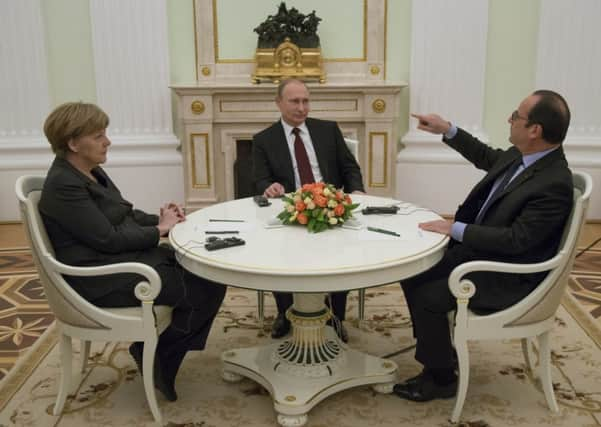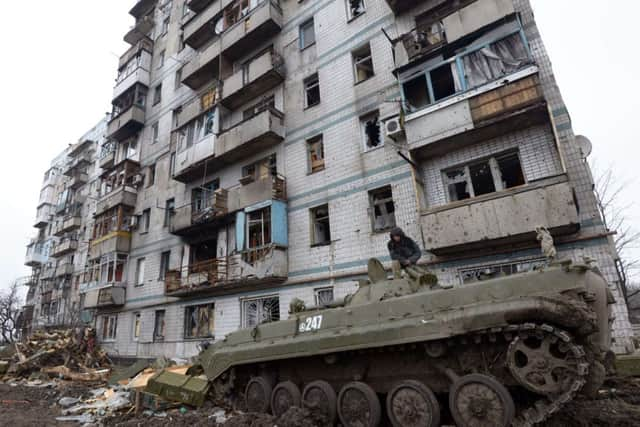Allan Massie: Mailed fist is no answer to Putin


The historian A J P Taylor was severely criticised when he observed that, in his foreign policy, Hitler was a traditional German statesmen pursuing traditional German aims. But he was right. Likewise Vladimir Putin is a traditional Russian statesman pursuing traditional Russian aims. We may not approve. We may say that his methods don’t belong in 21st century Europe, and that this sort of imperialism is out of date. But we should recognise that, in wishing to protect and extend the Russian sphere of influence, he is acting quite rationally. From the Russian point of view, what Putin is doing in Ukraine is no different from what the West as Nato did in promoting the Kosovo breakaway from Serbia and bombing Belgrade to persuade Serbia to acquiesce in the loss of one of its provinces.
It is all very well for Barack Obama to say that we cannot “allow the borders of Europe to be redrawn with the barrel of a gun”. Yet, this is precisely what we did in the case of Kosovo. Russia opposed the dismemberment of Serbia by military force just as we oppose the dismemberment of Ukraine.
Advertisement
Hide AdAdvertisement
Hide AdIt’s common to say Putin is paranoid. He is certainly both angry and nervous. The westward expansion of Nato since the end of the Cold War and the disintegration of the Soviet Union is, from the Russian point of view, unwelcome and alarming. We may think their alarm uncalled for, because we are confident we have no aggressive intentions. But that’s not how it looks from Moscow.


Moscow sees last year’s coup in Kiev as inspired and orchestrated by the USA and the EU. It responded by annexing and occupying Crimea – re-occupying, they would say, with some reason since Crimea only became part of Ukraine as a result of a re-drawing of administrative boundaries within the Soviet Union in the 1950s. Meanwhile many in the mostly Russian-speaking east of Ukraine oppose the present government in Kiev, and seek at least a large measure of autonomy, at most re-incorporation within Russia. They have been engaged in armed rebellion for more than a year, and nobody doubts that they have been supplied with Russian weapons and armour, and reinforced by Russian troops. This has led to demands in Washington, notably from the former Republican presidential candidate Senator John McCain, to supply the Kiev government with the arms and materials it says it needs. The USA, McCain said, should give “lethal assistance” to Kiev.
President Obama is holding the line against this, but may not be able to do so much longer. He will, however, doubtless note that the Polish defence minister, Tomasz Siemoniak, said the other day that this should be considered only as a last resort. Poland and other Nato states that have frontiers with Russia dread any intensification of military activity in Ukraine. Deepening the conflict risks widening it too. First you supply weapons, then advisers and then – who knows?
FOLLOW US
SCOTSMAN TABLET AND MOBILE APPS
Angela Merkel and Francois Hollande are engaged in trying to find a diplomatic solution. Sadly, perhaps, there is no role for David Cameron and the UK in these talks; we are seen as the USA’s poodle, not as an independent actor. Merkel, a realist, admits that it will be very difficult to come to an agreement, or one that will hold. It will surely be impossible if we in the West refuse to recognise that Russia’s interest in Ukraine is every bit as legitimate as ours, and indeed, on account of geography is more urgent. Any recognition of this will be met with charges that, as in the Thirties, we are engaged in appeasement. But appeasement, despite memories of Hitler and Munich, is not a dirty word. Churchill himself said that “jaw-jaw” is preferable to “war-war”. Moreover, though Churchill denounced the appeasement of Hitler, he and President Roosevelt practised appeasement in their conferences with Stalin, first at Teheran, then at Yalta. They did so because they recognised realities: that the Red Army was fighting and winning the war in the east, and that there was consequently nothing they could do – short of another war – to prevent the Soviet Union from achieving a dominant position in eastern Europe; hence the recognition of respective spheres of influence.
Now there is probably nothing we can do to compel the eastern provinces of Ukraine to submit to the present government in Kiev; and nothing we can do to deter Russia from supporting their defiance.
Any diplomatic settlement usually requires all parties to make the best of a bad job. Sanctions have damaged the Russian economy, and may be doing so sufficiently to make Putin ready to accept a compromise – so long as he doesn’t lose face and can present it as a victory. At the moment there is no reason for him to withdraw his support for the Russian-speaking Ukrainian rebels. Providing military assistance to the Kiev government – even if is falls short of the “lethal assistance” stupidly demanded by Senator McCain ,would be met by more direct Russian support for the rebels. It is always easier to start a war than to end one, as we have discovered in Iraq, and as the USA discovered in Vietnam.
The eastern Ukraine provinces should be offered autonomy, and we should make it clear that we have no intention of inviting Ukraine to join Nato, or to have anything more than friendly associate status with regard to the EU, for we shouldn’t promise what we can’t with impunity deliver. In return Putin must agree to withdraw Russian troops from Ukraine and we shouldn’t raise any objection if he presents this as a victory, “mission accomplished”. Sanctions should be lifted in stages, and it should be made clear that Russia will be welcomed back into what was known in the 19th century as “the Concert of Europe” – which is now “the Concert of the World”.
If you treat a country as a rogue state, it will act as a rogue state.
Advertisement
Hide AdAdvertisement
Hide AdIn truth, however, we have no interest in being on bad terms with Russia, and we have indeed a common enemy , that is Islamist terrorism and Islamist ambitions, which threaten the security of Russia just as they threaten the security and well-being of the West. In dealing with Putin’s Russia holding out the hand of friendship is better policy than raising a mailed fist.